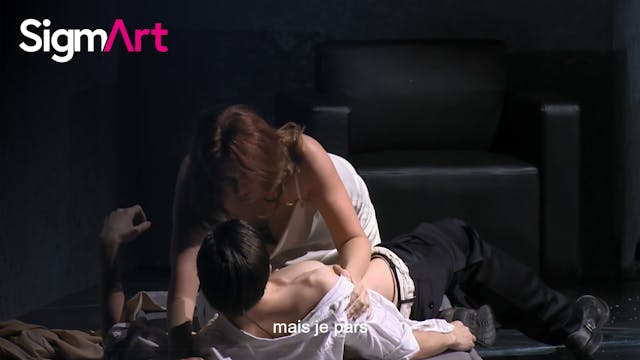IPHIGÉNIE EN TAURIDE Lyric Tragedy by Christoph Willibald Gluck
Drama & Lyric Tragedy
•
1h 54m
[Language: French]
Iphigénie en Tauride is a 1779 opera by Christoph Willibald Gluck in four acts. It was his fifth opera for the French stage. The libretto was written by Nicolas-François Guillard.
With Iphigénie, Gluck took his operatic reform to its logical conclusion. The recitatives are shorter and they are récitatif accompagné (i.e. the strings and perhaps other instruments are playing, not just continuo accompaniment). The normal dance movements that one finds in the French tragédie en musique are almost entirely absent. The drama is ultimately based on the play Iphigenia in Tauris by the ancient Greek dramatist Euripides which deals with stories concerning the family of Agamemnon in the aftermath of the Trojan War.
Based on the tragedy by Greek dramatist Euripides, Gluck’s story unfolds in the aftermath of the Trojan War. Iphigénie is a priestess in Tauris, under the rule of Thoas, King of Scythia. Tormented by a vision and desperate to save himself from danger, the King orders Iphigénie to kill any strangers that land on Scythia’s shores. But, unbeknownst to Iphigénie, her brother Orestes and his friend Pylades are the first to be shipwrecked on the peninsula. The priestess had believed her brother dead and responsible for the death of their mother. The siblings fail to recognise each other but Iphigénie takes pity on the ill-fated stranger and decides to save him from the sacrifice that only she knows awaits him. To do so she must make a choice between her duties as priestess and her loyalty to her family.
Iphigénie en Tauride, Gluck’s last Parisian triumph, is part of the lively quarrel between the “Gluckists” and the “Piccinists”.Fans of the Neapolitan composer Niccolo Piccini (1728-1800) praised the superiority of Italian opera over French opera, which Gluck and his admirers considered “the true dramatic musical genre”.The two rival composers squared off over a very popular subject, often exploited, whether by Campra, Scarlatti or Jomelli, to cite only the better known authors. The fate of Iphigenia, daughter of Agamemnon and Clytemnestra, abounds in dramatic conflicts and moving situations likely to arouse terror and emotion in the audience Gluck was addressing. His aesthetic reform of opera corresponds to a disruption in the sensibilities announced and ardently encouraged a few years earlier by Jean-Jacques Rousseau and Denis Diderot. Seeking simplicity and naturalness in the lyrical expression of feelings, Gluck turned away from the complicated plots and vocal prowess of “opera seria” to open the gates of Romanticism. With this new work, audiences seemed to rediscover a taste for theatre, as Baron Brimm put it so well in his Literary Correspondence: “When I hear Iphigénie, I forget I am at the opera; I think I am, listening to a Greek tragedy (…).”I don’t know if that is singing, but perhaps it’s much better.”
Direction: Alan Woodbridge (Director), Hartmut Haenchen (Music Conductor)
Cast: Orchestre de la Suisse Romande, Choir of the Grand Théȃtre de Genève, Caterina Antonacci (Iphigénie), Bruno Taddia (Oreste), Steve Davislim (Pylade), Alexey Tikhomirov (Thoas), Julienne Walker (Diane), Michel de Souza (Un Scythe)
Up Next in Drama & Lyric Tragedy
-
KING ARTHUR Lyric Tragedy by Henry Pu...
Language: English
Subtitles: English, French, German, Italian, SpanishKing Arthur, or The British Worthy, is a semi-opera in five acts with music by Henry Purcell and a libretto by John Dryden. It was first performed at the Queen's Theatre, Dorset Garden, London, in late May or early June 1691....
-
MÉDÉE Lyric Tragedy by Marc-Antoine C...
[Language: French with Burnt-in French Subtitles]
Médée is a tragédie mise en musique in five acts and a prologue by Marc-Antoine Charpentier to a French libretto by Thomas Corneille. It was premiered at the Théâtre du Palais-Royal in Paris on December 4, 1693, in the presence of Louis XIV. Médé...


